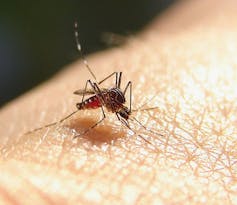It’s quite a romantic notion that the sweetness of our blood attracts mosquitoes. But in reality, it’s probably the cocktail of stinky microbes on our skin that really draws them in.
It’s hard to know where this myth started. Perhaps because some insects are known pollinators and attracted to nectar and other plant juices, it was considered that mosquitoes behave similarly? Mosquitoes do feed on plant sugars and this has been exploited in the development of new mosquito-borne disease surveillance strategies in Australia and North America.
As the saying goes, a spoonful of sugar helps the medicine go down. Perhaps consoling a mosquito bite-covered friend with the words “it must be your sweet blood” can take the edge off the itch?
It is true that only female mosquitoes bite. She bites to get a hit of protein required for egg development, but preferences for that blood can vary greatly. Some prefer to bite mammals. Some prefer birds. Some even prefer to bite frogs. And, unfortunately, some prefer to bite humans.
There is strong evidence that we all differ in our attractiveness to biting mosquitoes. They are firstly attracted by the carbon dioxide we exhale. Body heat plays a role in attraction too. But while mosquitoes may bite us to get a feed of blood, our blood itself doesn’t seem to influence who they bite.

Although studies have suggested that mosquitoes are more attracted to individuals with Type O blood, the results are far from conclusive. The trend isn’t likely to be consistent for all mosquito species either and it certainly isn’t only those people with Type O blood that get bitten.
Odours produced by microbes on our skin have been shown to attract mosquitoes – and there can be quite a cocktail of smells emanating from us. More than 300 chemical compounds have been identified from human skin and the abundance of some of these can vary on a daily basis. Differences in the attractiveness of individuals to mosquitoes may be explained by differences in the abundance and diversity of these microbes.
Keep in mind that not all these compounds will attract mosquitoes. Some will actually reduce the likelihood of being bitten.
So what does this all mean for those wanting to be less attractive to mosquitoes?
Researchers may one day produce new repellents or more effective mosquito traps but the take-home message from decades of research is that everyone varies a little in their attractiveness to biting mosquitoes. You may never know exactly why you get bitten more than your friends.
Remember, it only takes one bite for the transmission of a disease-causing pathogen, so even if you don’t think you’re top of the list on a mosquito’s menu, take precautions to prevent bites.

